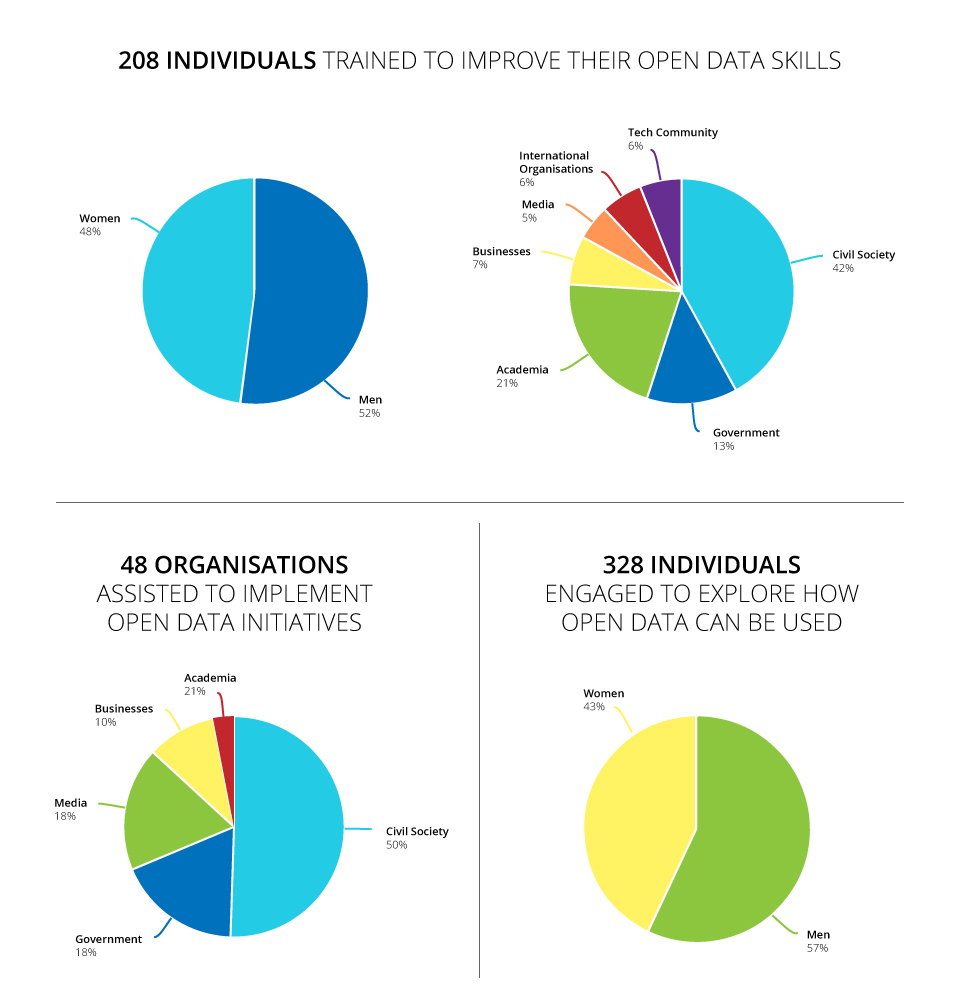 Three years ago, we soft- launched the Open Data Lab Jakarta with the goal of doing our part for an inclusive and sustainable open data revolution in Southeast Asia. Since its inception, the Jakarta Lab has been working with policy-makers, researchers, and practitioners to develop and test effective solutions to complex social and governance-related challenges using open data. We kickstarted our work in the Philippines and Indonesia for our first year, then expanded to include Malaysia and Nepal in our second year. During this period, we also reached out to organisations in the Asia-Pacific to together set the agenda for open data in the region, through a regional workshop. Finally, in our third year, we engaged with partners from Vietnam, Singapore, India, Taiwan, and Australia to find ways on how we can develop innovative ways in working with open data through a series of activities that took place in what we dubbed as the ‘Open Data Innovation Week’. We’ve worked in at least 10 subnational governments across Southeast Asia, testing different approaches on how open data can be used to promote transparency or improve public service delivery.
Three years ago, we soft- launched the Open Data Lab Jakarta with the goal of doing our part for an inclusive and sustainable open data revolution in Southeast Asia. Since its inception, the Jakarta Lab has been working with policy-makers, researchers, and practitioners to develop and test effective solutions to complex social and governance-related challenges using open data. We kickstarted our work in the Philippines and Indonesia for our first year, then expanded to include Malaysia and Nepal in our second year. During this period, we also reached out to organisations in the Asia-Pacific to together set the agenda for open data in the region, through a regional workshop. Finally, in our third year, we engaged with partners from Vietnam, Singapore, India, Taiwan, and Australia to find ways on how we can develop innovative ways in working with open data through a series of activities that took place in what we dubbed as the ‘Open Data Innovation Week’. We’ve worked in at least 10 subnational governments across Southeast Asia, testing different approaches on how open data can be used to promote transparency or improve public service delivery.
What are the Jakarta Lab’s key achievements in its third year?
In 2016, we…
—- trained 208 individuals (52% men, 48% women) to gain or improve their open data skills, coming from civil society (42%), government (13%), academia (21%), business (7%), media (5%), international organisations (6%), and the tech community (6%).
—- assisted 48 organisations (50% civil society, 18% government, 18% media, 10% business, and 3% academia) to implement open data initiatives that enabled more citizens to participate in local governance.
—- engaged with 328 individuals (57% men, 43% women) to explore how open data can be used in improving transparency, accountability, and public service delivery, especially at the local level.
As a result of this, we were able to….
—-help push out the publication of 310 datasets covering different sectors as health, education, transport, and public finance, among others.
—-build the capacity of more than 30 intermediaries, the majority of which are civil society organisations, to use open data to solve actual problems faced by citizens.
Our main challenge in moving forward is to ensure that these initial gains are translated into actual benefits impacting the lives of citizens. For example, our partner GeRAK Aceh was able to extend the moratorium on mining activities in Aceh province using mining data. We need to know how this has benefitted the farmers whose livelihood is dependent on the abundance and quality of natural resources. Similarly, Perkumpulan IDEA whom we have worked with on budget transparency projects has uncovered, using open data, the low utilisation of village development funds and advocated for better spending of public money. We now need to understand how this has impacted the well-being of people in villages within the city of Yogyakarta.
There is much more work left to do—and one of this is the formidable challenge of collating more than just anecdotal evidence on how open data can ultimately benefit poor and marginalised citizens. In the ensuing year, as the Jakarta Lab enters its 4th year of operation, we believe that finding this evidence is a primordial and important task.
To get to know more about what we do and how we work with open data, visit our project pages and resource section. Stay updated on our activities through our blog, or follow us on Twitter @ODLabJkt. We hope to hear from you, as we explore more about open data’s impact this year!
Leave a Reply